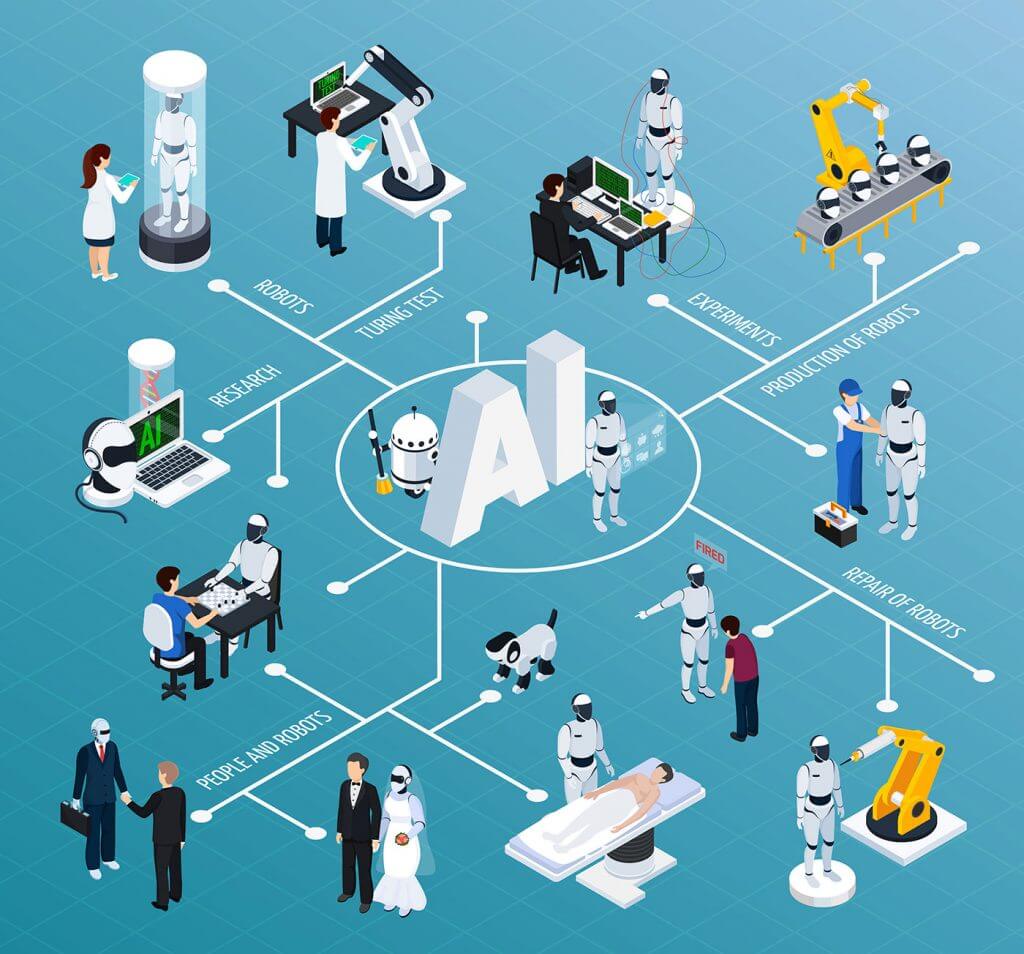Today, investing in Artificial Intelligence (AI) stocks and shares is a highly speculative move. After all, this industry is still well within its infancy and could rapidly morph into something completely different over the next decade. But the benefits of the technology cannot be ignored. Companies worldwide have begun integrating AI systems into their pipeline to improve their offerings and operations.
In fact, this technology is penetrating almost every sector of the economy today. And forecasts predict this transition will continue to accelerate in the future. That, to me, sounds like a huge investment opportunity for investors. So, let’s explore the stock market sector in more detail and discover the potential growth and risks that come with it.
What are AI Stocks?
AI stocks refer to the companies which design or develop systems to perform tasks independent of humans. In other words, it’s a mimicry of human intelligence applied through technology. And today is often used in various applications such as big data analytics, machine learning, deep learning, cyber security, and scientific research.
The exciting thing about AI is that it theoretically eliminates the risk of human error while simultaneously improving efficiency. The finance, healthcare, transportation, and manufacturing sectors are already integrating AI tools and applications into their work procedures.
But it’s important to realise that investors need to differentiate between different types of AI before thinking about investing in these stocks and shares.
- Narrow Artificial Intelligence – This is also known as weak AI. Here the machine is built to perform only a specific human function or task. Any other task outside the scope of that single function cannot be achieved by such a machine. This is the most common type of AI and includes technologies such as facial recognition, speech detection, and algorithms used in search engines. IBM’s Watson and Google Search all use narrow AI. This particular type of artificial intelligence, due to its non-sophistication, tends to be advantageous to companies operating it as they tend to generate more revenue over time.
- General Artificial Intelligence – This is also known as deep AI. These types of artificial intelligence systems focus on the machine carrying out any function a human can perform. The goal is to have the capability of solving any problem human intelligence can solve. Hence, the name general artificial Intelligence is in its capability because the machine is not restricted to a particular function. General AI has not been fully developed as research is still being carried out to bring it to reality. Microsoft, Alphabet and Darktrace, among other companies, are building this technology.
- Super Artificial Intelligence – This is also known as self-aware artificial intelligence. These AI models allow for the creation of machines that will be able to have more than human intelligence. Their cognitive reasoning and thinking skills will be far above that of humans and be on their own level. In other words, they will surpass human intelligence in their task performance. They will be self-aware and conscious of their feelings, emotions and environment. This is what most individuals think of when they hear the words AI, but it’s far from reality at this stage.

What are the Main Risks and Challenges AI Stocks Face?
The AI market is full of potential, but that comes with an equal number of uncertainties. There aren’t that many pure-play AI shares around today due to the early-stage nature of the technology. And that companies that are utilising AI typically include it as a feature for a larger project. For example, C3.AI provides a data analytics solution that offers machine learning capabilities as part of this larger project.
A growing concern in this field is the redundancy of humans. Predictions suggest that AI will soon be capable of replacing most manual labour roles. And we’ve already started seeing this shift with warehouse and factory automation. If this leads to a substantial rise in unemployment, government intervention could cause a severe slowdown in growth capabilities.
Investing in AI shares also comes with the risk of a design flaw. AI today is typically “taught” by using enormous datasets to “learn” how to achieve a specific objective. However, if this data becomes compromised, the wrong lesson may be taught without it being immediately apparent. This could lead to major errors later down the line, such as wrong shipments being sent out or cyber-security breaches not being recognised and prevented.
All the main threats to the AI industry stem from a single factor – uncertainty. The infancy of this technology makes it exceptionally difficult to predict its capabilities, so there is quite a polar opinion about it. Needless to say, this uncertainty makes investing in artificial intelligence stocks and shares a risky endeavour.
Key Financial Metrics
Below are some key financial metrics investors should know to help them assess their investment in AI shares.
- Price to Cash Flow – This measures the value of stock price relative to its operating cash flow. AI stocks can be highly speculative and require a lot of cash flow. This metric is a quick method of discovering whether shares are being priced too high relative to their competitors.
- Net Profit Margin – This shows how much net profit or income is made from the revenue. It is calculated by dividing the net profits by the net sales.
- Gross Profit Margin – This metric is used to measure how much profit a company makes after removing the cost of goods sold. The gross profit margin is also known as the gross margin ratio. It compares the gross margin of a company to its revenue.
- Return on Assets – ROA measures how a company is using its assets to generate revenues.
- Price to Sale – This compares a company’s stock price to its revenue. It’s another ratio to determine the relative valuation of these businesses, many of which are unprofitable.
Key Terms to Know When Investing in AI Stocks
This industry is understandably complex and has a lot of unexplained jargon thrown around. So let’s take a look at some of the most common terminologies used by AI stocks.
- Action Selection – This is the way of characterising the most basic problem of an intelligent system: what to do next.
- Algorithm – This is an unambiguous specification of solving a class of problems.
- Information Processing Language – This is a programming language that includes features intended to help with programs that perform simple problem-solving actions.
- Search Algorithm – This is an algorithm which solves search problems, for example, which websites contain the answers to a particular query by a user.
- Self-Management – This is the process by which a computer system manages its own operation without human intervention.
- Formal Language – This is a set of words whose letters are taken from the alphabet and well-formed according to a specific set of rules.
- Vision Processing Unit – This is a type of microprocessor designed to accelerate machine vision tasks.
What is the Potential Market Size?
At the end of 2021, the global artificial intelligence market size had reached $87.04bn. That’s according to a report written by Precedence Research. And the group also predicts the sector to continue growing by a staggering annualised compound rate of 38.1% between 2022 and 2030, reaching $1.597trn!
Such a rapid growth rate sounds unbelievable, but it may be close to reality. After all, the pandemic recently demonstrated the benefits of automation and AI-assisted operations. With more companies looking to optimise and streamline themselves, demand for this technology across its various forms is bound to surge. At least, that’s what I think.
Top AI Stocks in the UK by Market Capitalisation
Below are the top four AI shares listed on the London Stock Exchange in the UK by market capitalisation.
| Company | Market Cap. | Description |
|---|---|---|
| Ocado Group (LSE:OCDO) | £6.45bn | Ocado is an online retail company that uses AI to determine how orders should be packed. |
| Darktrace (LSE:DARK) | £2.54bn | Darktrace is an AI company using artificial intelligence to interrupt in-progress cyber-attacks in seconds, including ransomware, email phishing, and threats to cloud environments and critical infrastructure. |
| Kainos Group (LSE:KNOS) | £1.56bn | Kainos provides digital technology services and platforms for public and private organisations. |
| Tpximpact Holdings (LSE:TPX) | £141.04m | Tpximpact Holdings provides digital native technology services. |
Top AI stocks in the US by Market Capitalisation
Below are the top five AI stocks in the US by Market capitalisation.
| Company | Market Cap. | Description |
|---|---|---|
| Microsoft Corporation (NASDAQ:MSFT) | $2.04trn | Microsoft develops, licenses, and supports software, services, devices, and solutions worldwide. Microsoft has invested heavily in AI. |
| Alphabet (NASDAQ:GOOGL) | $1.48trn | Alphabet uses AI in its search engine. The company focuses on AI enablers. |
| Amazon.com (NASDAQ:AMZN) | $1.17trn | Amazon invests heavily in AI technology. Amazon uses AI in its Alexa. |
| Meta Platforms (NASDAQ:FB) | $528.08bn | an AI system that can automatically learn from given data or adapt to new environments rapidly with minimal supervision from human experts. |
| NVIDIA Corporation (NASDAQ:NVDA) | $471.03bn | Nvidia operates an open AI car computing platform that enables automakers and their suppliers to accelerate the production of autonomous vehicles. |
Should I Buy AI stocks in my Portfolio?
The artificial intelligence sector is growing and developing quickly. It’s already infiltrating many sectors of the global economy. And as demand rises, the growth potential for AI shares is bound to increase. That, to me, sounds like an enticing opportunity.
Having said that, I’m not blind to the risks of this sector. It’s undeniably a volatile space which isn’t suitable for investors that are risk-averse. Personally, I plan on taking a diversified approach when investing in AI stocks and shares for my portfolio.
Discover market-beating stock ideas today. Join our Premium investing service to get instant access to analyst opinions, in-depth research, our Moonshot Opportunities, and more. Learn More
Prosper Ambaka does not own shares in any of the companies mentioned. The Money Cog has published Premium reports on Ocado, NVIDIA Corp, and C3.AI. Views expressed on the companies and assets mentioned in this article are those of the writer and therefore may differ from the opinions of analysts in The Money Cog Premium services.





